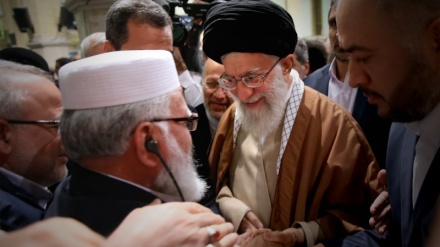A call to reason
Islamabad’s recent joining of the so-called coalition of countries against terror, under the auspices of Takfiri-backer Saudi Arabia, and naming of its ex-army chief as overall commander of the joint military forces, has drawn sharp criticism in Pakistan.
The move has been considered as an “unwise anti-Shi’a Muslim move” likely to strain the traditionally friendly relations with neighbour Iran. Here's an analysis in this regard by Pakistan’s Raoof Hassan, who is a political and security strategist, and heads the Regional Peace Institute – an Islamabad-based think tank.
The Saudi-led coalition will not be perceived as a coalition against terror. It will be perceived only as an anti-Shi’a coalition. For Pakistan, joining such a grouping is like shooting itself in the foot.
To quote the ancient Roman thinker Marcus Tullius Cicero in his work “On the laws”: “For there is but one essential justice which cements society, and one law which establishes this justice. This law is right reason, which is the true rule of all commandments and prohibitions. Whoever neglects this law, whether written or unwritten, is necessarily unjust and wicked.”
When Marcus Cicero talked of right reason, he covered the entire repertoire where it needs to be applied in one’s pursuit of taking decisions which will be rendered acceptable across divides – an onerously difficult option to pursue under charged circumstances that are virtually catapulting out of control. But that makes the need to follow reason even more emergent and more advisable, as one’s ultimate weapon for ascendance over challenges.
In view of this, the decision to join the Saudi-led coalition against so-called terrorism remains a mystery. This is based on stories that people at some high places have to narrate about it, and the reasons they cite necessitating Pakistan’s plunge into this decidedly divisive stratagem. The leading lights of Pakistan’s foreign office have stated on record that the Terms of Reference (TORs) of the proposed coalition against terrorism have not been finalized. Understandably, this task is likely to be undertaken at a meeting of defence ministers of the countries which have joined the coalition, sometime next month.
Under these circumstances, the obvious question that arises is: what were the compulsions that forced Pakistan to join the coalition and allow one of its recently retired Chiefs of Army Staff (COAS) to accept the command of the outfit, even before the outline of responsibilities was chiselled - and this in the presence of a clear Parliamentary resolution keeping Pakistan out of the Yemen crisis?
On the face of it, only a country which is in dire need of accepting whatever is offered on the platter, or which does not have the option of saying no, will take such an offer.
Let’s traverse into the realm of prospects and possibilities that may have necessitated resorting to this dire decision-making mechanism: that of accepting a responsibility before you even know what it entails doing in the position that you are assuming. Conceding that bulk of the pressure would have emanated from Saudi Arabia, what are Pakistan’s pressing fault lines that would have made it unbearable?
Is it the subservience of its current political leadership to the Saudi largesse in playing the host during their years in exile, and a possible repeat of the prospect in the future, post an adverse Panama Case judgment?
Or, is it the future of those hundreds-of-thousands of Pakistani workers in Saudi Arabia who could be deported, there being no democracy in that land that we have sworn to defend, by the mere nod of an autocratic hand?
Or, is it the fear of the stoppage of the trail of cash injections that keep pouring in whenever the ruling elite are in need, particularly the one that is in command at this juncture? Or, is it the bondage secured in religiosity?
And, most importantly, is the cumulative pressure of all this so unbearable that Pakistan should forego the rational process and fall prey to a decision which is likely to draw a divisive line right in its middle?
With the sectarian divide in Pakistan not being a secret, hundreds of people having already fallen victim to indescribable atrocities committed in the name of this malaise, and an appreciable number of Shi’a population in the country, feelings are likely to get further incensed.
The government functionaries claim that the prospective coalition is not against any country. Yet, no Shi’a country has so far been invited to join it. It is also understood to be a coalition to fight terror. Should we, therefore, conclude that the Shi’a countries are not confronted with the threat of terror?
More pearls of wisdom have flowed from rulers and their deputies. They say that most of the Shi’a countries don’t qualify to be in the coalition because they don’t have governments that can take decisions without outside interference. Only Iran qualifies, and it will be approached in due course to become part of the coalition. Why Iran has not already been invited to join remains a mystery. When the Iranian Ambassador objected publicly to Pakistan assuming the leadership role in the coalition, it was simply brushed away.
The issuance of the No Objection Certificate to the former COAS has countless, embarrassingly contradictory, versions floating around.
This flawed narrative which is being systematically projected is not the outcome of a pragmatic process of thinking with Pakistan’s interests at its core. On the contrary, it reflects utter foolhardiness and ambivalence at its worst. We are part of a coalition against terror which does not have any TORs and no Shi’a country has been invited to join it. Further, we have allowed our former COAS to head it. The patent perception that this non-Shi’a coalition will create will be hard to contest. It’ll not be perceived as a coalition against terror. It will be perceived only as an anti-Shi’a coalition. For Pakistan, joining such a grouping is like shooting itself in the foot.
On the subject of reason, I am reminded of another masterly saying by the English poet - Lord Byron: “Those who will not reason, are bigots, those who cannot, are fools, and those who dare not, are slaves.”
What are we out of the lot: bigots, fools, or slaves? Or, a bit of all put into one? Whichever designation we may assume, we are doomed as a nation that has lost its self-respect, and that can’t stand up to facing challenges in a self-assured and pragmatic manner. This is not the beginning of the decline. The decline had set in a long time ago. It is only a sad reflection of further perpetuation of the ailment – an ailment which is now well beyond any prognosis. It is the stock of leadership, sire!
SS/EA



